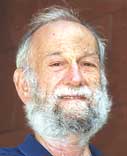Joseph Veroff
Joseph Veroff, a professor of psychology and research scientist at the Institute for Social Research (ISR), died Sept. 30 in Ann Arbor. He was 77.

Veroff directed a landmark study tracing how American values, attitudes and behavior changed from 1957-76. His research provided some of the first empirical data showing how American values, behavior and attitudes toward work, marriage and parenthood shifted during the ’60s, a critical time for the nation. With Elizabeth Douvan and Richard Kulka, Veroff co-authored two influential books based on findings from two nationally representative ISR surveys on these topics: “The Inner American: A Self-Portrait from 1957 to 1976” and “Mental Health in America: Patterns of Help-Seeking from 1957 to 1976.” This work replicated and extended the landmark study from the 1950s with Gerald Gurin and Sheila Feld: “Americans View Their Mental Health.”
Veroff co-authored several other books, including “Marital Instability: A Social and Behavioral Study of the Early Years,” with Douvan and Shirley Hatchett, and “Thrice Told Tales: Married Couples Tell Their Stories,” with Diane Homberg and Terri Orbuch. These volumes are based on data from the ISR Early Years of Marriage Project, initiated in 1986.
“His early work on human motivation — for example in his book with his wife Joanne Veroff on ‘Social Incentives: A Lifespan Developmental Approach’ — stimulated decades of research in personality psychology,” says David Winter, a colleague in psychology. “At the same time, he was always careful to understand individual personality in broader American social contexts, including age, race, class and gender.”
In his last book, “Savoring: A New Model of Positive Experience,” written with Fred Bryant of Loyola University of Chicago, Veroff focused explicitly on measuring and studying the “capacity to attend to, appreciate and enhance the positive experiences in one’s life.”
With Douvan, Veroff was a founding member of the Family and Sex Roles Program (later the Life Course Development Program) at ISR.
He made significant contributions to the Department of Psychology, serving as graduate chair for many years. He taught and mentored generations of young scholars with a combination of high intellectual standards, clear expectations of hard work, research, a wry and clever sense of humor, and good food. “It is hard to pass the old Veroff house on Granger without thinking of the many casual get-togethers for faculty and students, replete with wonderful home-cooked dishes, engaging conversation and good company that he and Jody provided for scores of scholars over the years,” said Toni Antonucci, the Elizabeth M. Douvan Collegiate Professor of Psychology, director of the ISR Life Course Development Program and a former post-doctoral fellow.
Other colleagues remembered Veroff as a respected and beloved teacher and mentor, who pioneered in supporting, nurturing, and training the graduate education and career development of underrepresented groups in psychology. “I, and many other women who got their doctorates in psychology when women were still a small minority in the profession, had successful outcomes only by the good fortune of working with someone as respectful and encouraging as Joe Veroff,” says Wendy House, a former student.
“Joe’s capacity for collaboration was remarkable,” says Abby Stewart, a psychologist who collaborated with Veroff on the marriage project. “He loved to bring students and colleagues together and exchange ideas. His research group was always lively, producing data analysis, good food and good company in equal parts. Joe’s savoring of these pleasures was contagious.”
Veroff received his bachelor’s degree in 1950 at Wesleyan University and his master’s and doctorate degrees at U-M.
He was an instructor at Princeton University in 1955-56, then returned to U-M as a study director at the ISR Survey Research Center. After serving as a lecturer in the Department of Psychology, he was promoted to assistant professor in 1958, associate professor in 1962 and professor in 1967. In 1975 he was named a faculty associate at ISR and in1985, he became an ISR research professor.
Veroff is survived by his wife Jody, children Susie, Matt, Dan, Paul and David, 10 grandchildren, and two great grandchildren.
A memorial service is scheduled for 2 p.m. Nov. 24 in 1324 East Hall.
The Joseph Veroff Graduate Support Fund has been established to benefit students in psychology and ISR. To make a contribution, contact the Department of Psychology at 615-0070.

